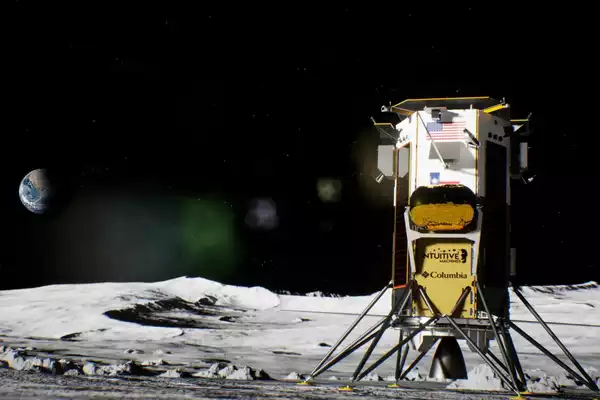The Intuitive Machines spacecraft, part of NASA’s Commercial Lunar Payload Services (CLPS) initiative, was launched recently.
About the mission:
- The IM-1 (Intuitive Machines 1) is a Nova-C (Odysseus) class lunar lander was launched on a SpaceX Falcon 9 rocket.
- Odysseus, part of the CLPS program, is on its IM-1 mission, carrying six NASA experiments and technology demonstrations, alongside six private payloads.
- If successful, the IM-1’s soft moon landing will be the first American-made spacecraft landing since Apollo 17, and the first by a private company.
- The Odysseus landing site is Malapert A, aiming for the Moon’s south pole, where scientists anticipate the presence of water, opening new avenues for exploration.
- NASA anticipates that, if the landing proceeds as planned, the lander will operate for about two weeks in sunlight, providing valuable insights.
- The technology onboard will focus on investigating lunar dust, studying space weather, and determining the required propellant for a successful lunar landing.
Significance of IM-1 Flight:
- The data collected during Odysseus’ mission is crucial for future human exploration, particularly for upcoming Artemis missions.
- Represents the first controlled descent to the lunar surface by a U.S. spacecraft since the Apollo crewed moon mission in 1972.
- Historic achievement as the first lunar journey under NASA’s Artemis moon program.
CLPS Program and Artemis:
- The Commercial Lunar Payload Services (CLPS) program, a collaborative effort between NASA and private entities, facilitates the placement of agency science instruments on private robotic moon landers.
- CLPS aims to deploy science instruments on private lunar landers to collect crucial data for NASA’s Artemis program.
- Artemis seeks to establish a crewed lunar base near the south pole of the Moon by the end of the 2020s.
- The first CLPS effort, Peregrine, launched successfully but experienced a fuel leak, leading to a controlled destruction in Earth’s atmosphere.
Recent Failed lunar landing on Moon’s South Pole:
Chandrayaan-2
- In 2023, India’s attempt to land near the moon’s south pole failed when mission managers lost contact with the lander just seconds before touchdown.
Luna-25
- In 2023, Russia’s Luna-25 craft spun out of control on approach and crashed.
Hakuto-R:
- A Japanese firm’s lander crashed during landing
SpaceIL’s Beresheet spacecraft:
- An attempt by the Israeli private space agency
Peregrine:
- Launched successfully but experienced a fuel leak.
Ref: Source
| UPSC IAS Preparation Resources | |
| Current Affairs Analysis | Topperspedia |
| GS Shots | Simply Explained |
| Daily Flash Cards | Daily Quiz |



